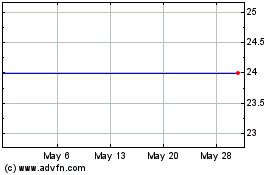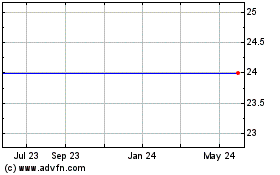Despite The Challenges, Burger King Fits Private Equity's Bill
03 September 2010 - 5:51AM
Dow Jones News
Burger King Holdings Inc. (BKC) offers its potential new owners
the steady cash flow that private-equity craves, but the burger
giant also comes with huge hurdles--a surging rival in McDonald's
Corp. (MCD), an aging store base and high unemployment affecting
sales.
3G Capital Management Inc.'s $4 billion offer, including debt,
for Burger King comes across as a classic private-equity play
regarding restaurants: Borrow heavily to buy a chain with a large
franchise base and pay down the debt over time with cash from
franchisee royalty payments and other fees.
"It's literally paying down debt, staying the course and riding
any improvement in the economy," restaurant consultant Mark
Saltzgaber said.
The franchise model has attracted marquee private equity players
to buy restaurant chains like Domino's Pizza Inc. (DPZ), the
privately held Dunkin Donuts and a smattering of smaller concepts
over the past decade or so.
Burger King already has gone through the private-equity cycle.
In 2002, TPG Capital LLC, Bain Capital LLC and Goldman Sachs
Capital Partners carved Burger King out of Diageo PLC (DEO). While
setting Burger King up as a standalone company, new ownership also
helped stabilize some troubles at the company. It shuttered nearly
1,200 Burger King restaurants thereafter, many coming from
franchisees struggling under too much debt.
Despite the changes, Burger King found its sales struggling as
the economy slipped into a recession. Unemployment weighed heavily
on core customers such as teens, young men and some minority
groups. McDonald's also continued to push into new product
categories including smoothies and coffee, attracting more
customers. Burger King also has a store base that's viewed as older
than its competitors.
Burger King's market share has gradually declined. Its sales
made up 13.9% of the U.S. fast-food market in 2009, down from 18.8%
in 2000, according to the research firm Technomic Inc.
Burger King the chain has implemented some sales strategies
already--like premium products on a new broiler--that have shown
some promise but have been hampered by a slow recovery. A private
investor like 3G Capital could have the patience to wait out such
rebound, as oppose to investors in a public company that reports
results quarterly.
3G Capital also has told franchisees in a letter that it was
attracted to Burger King's product pipeline, including new
breakfast items, as well as opportunities for expansion in Asia and
Latin America.
Burger King shares recently rose $4.66, or 24.7%, to $23.52.
-By Paul Ziobro, Dow Jones Newswires; 212-416-2194;
paul.ziobro@dowjones.com
Burger King Holdings (NYSE:BKC)
Historical Stock Chart
From Oct 2024 to Nov 2024

Burger King Holdings (NYSE:BKC)
Historical Stock Chart
From Nov 2023 to Nov 2024
